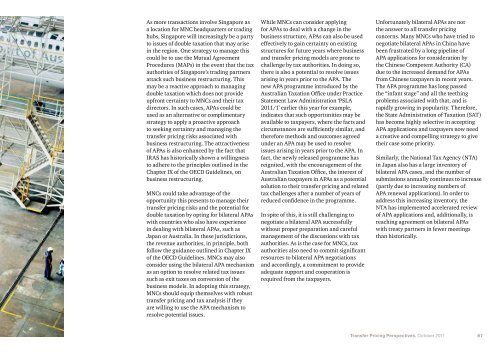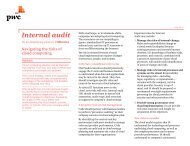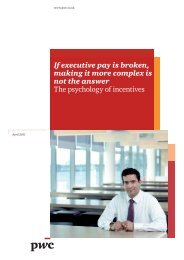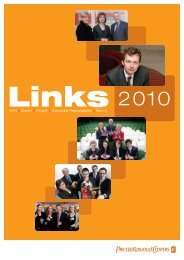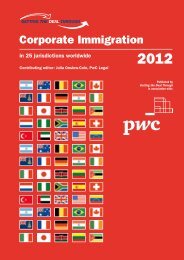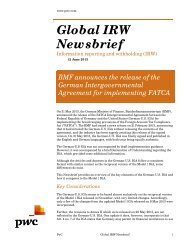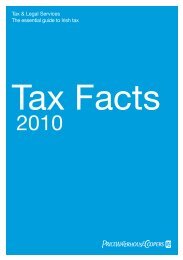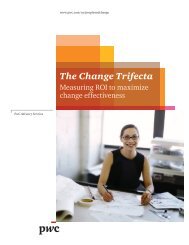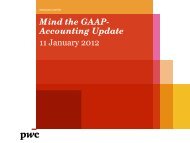Transfer pricing perspectives: Winds of Change - PwC
Transfer pricing perspectives: Winds of Change - PwC
Transfer pricing perspectives: Winds of Change - PwC
Create successful ePaper yourself
Turn your PDF publications into a flip-book with our unique Google optimized e-Paper software.
As more transactions involve Singapore asa location for MNC headquarters or tradinghubs, Singapore will increasingly be a partyto issues <strong>of</strong> double taxation that may arisein the region. One strategy to manage thiscould be to use the Mutual AgreementProcedures (MAPs) in the event that the taxauthorities <strong>of</strong> Singapore’s trading partnersattack such business restructuring. Thismay be a reactive approach to managingdouble taxation which does not provideupfront certainty to MNCs and their taxdirectors. In such cases, APAs could beused as an alternative or complimentarystrategy to apply a proactive approachto seeking certainty and managing thetransfer <strong>pricing</strong> risks associated withbusiness restructuring. The attractiveness<strong>of</strong> APAs is also enhanced by the fact thatIRAS has historically shown a willingnessto adhere to the principles outlined in theChapter IX <strong>of</strong> the OECD Guidelines, onbusiness restructuring.MNCs could take advantage <strong>of</strong> theopportunity this presents to manage theirtransfer <strong>pricing</strong> risks and the potential fordouble taxation by opting for bilateral APAswith countries who also have experiencein dealing with bilateral APAs, such asJapan or Australia. In these jurisdictions,the revenue authorities, in principle, bothfollow the guidance outlined in Chapter IX<strong>of</strong> the OECD Guidelines. MNCs may alsoconsider using the bilateral APA mechanismas an option to resolve related tax issuessuch as exit taxes on conversion <strong>of</strong> thebusiness models. In adopting this strategy,MNCs should equip themselves with robusttransfer <strong>pricing</strong> and tax analysis if theyare willing to use the APA mechanism toresolve potential issues.While MNCs can consider applyingfor APAs to deal with a change in thebusiness structure, APAs can also be usedeffectively to gain certainty on existingstructures for future years where businessand transfer <strong>pricing</strong> models are prone tochallenge by tax authorities. In doing so,there is also a potential to resolve issuesarising in years prior to the APA. Thenew APA programme introduced by theAustralian Taxation Office under PracticeStatement Law Administration ‘PSLA2011/1’ earlier this year for example,indicates that such opportunities may beavailable to taxpayers, where the facts andcircumstances are sufficiently similar, andtherefore methods and outcomes agreedunder an APA may be used to resolveissues arising in years prior to the APA. Infact, the newly released programme hasreignited, with the encouragement <strong>of</strong> theAustralian Taxation Office, the interest <strong>of</strong>Australian taxpayers in APAs as a potentialsolution to their transfer <strong>pricing</strong> and relatedtax challenges after a number <strong>of</strong> years <strong>of</strong>reduced confidence in the programme.In spite <strong>of</strong> this, it is still challenging tonegotiate a bilateral APA successfullywithout proper preparation and carefulmanagement <strong>of</strong> the discussions with taxauthorities. As is the case for MNCs, taxauthorities also need to commit significantresources to bilateral APA negotiationsand accordingly, a commitment to provideadequate support and cooperation isrequired from the taxpayers.Unfortunately bilateral APAs are notthe answer to all transfer <strong>pricing</strong>concerns. Many MNCs who have tried tonegotiate bilateral APAs in China havebeen frustrated by a long pipeline <strong>of</strong>APA applications for consideration bythe Chinese Competent Authority (CA)due to the increased demand for APAsfrom Chinese taxpayers in recent years.The APA programme has long passedthe “infant stage” and all the teethingproblems associated with that, and israpidly growing in popularity. Therefore,the State Administration <strong>of</strong> Taxation (SAT)has become highly selective in acceptingAPA applications and taxpayers now needa creative and compelling strategy to givetheir case some priority.Similarly, the National Tax Agency (NTA)in Japan also has a large inventory <strong>of</strong>bilateral APA cases, and the number <strong>of</strong>submissions annually continues to increase(partly due to increasing numbers <strong>of</strong>APA renewal applications). In order toaddress this increasing inventory, theNTA has implemented accelerated review<strong>of</strong> APA applications and, additionally, isreaching agreement on bilateral APAswith treaty partners in fewer meetingsthan historically.<strong>Transfer</strong> Pricing Perspectives. October 201161


